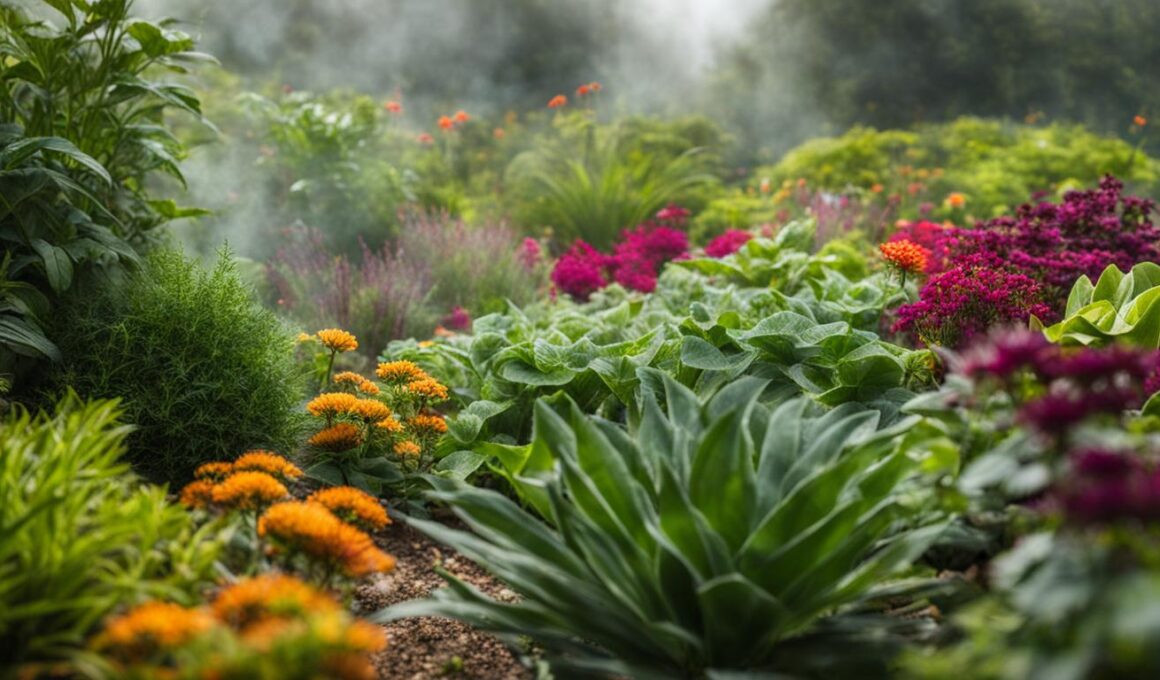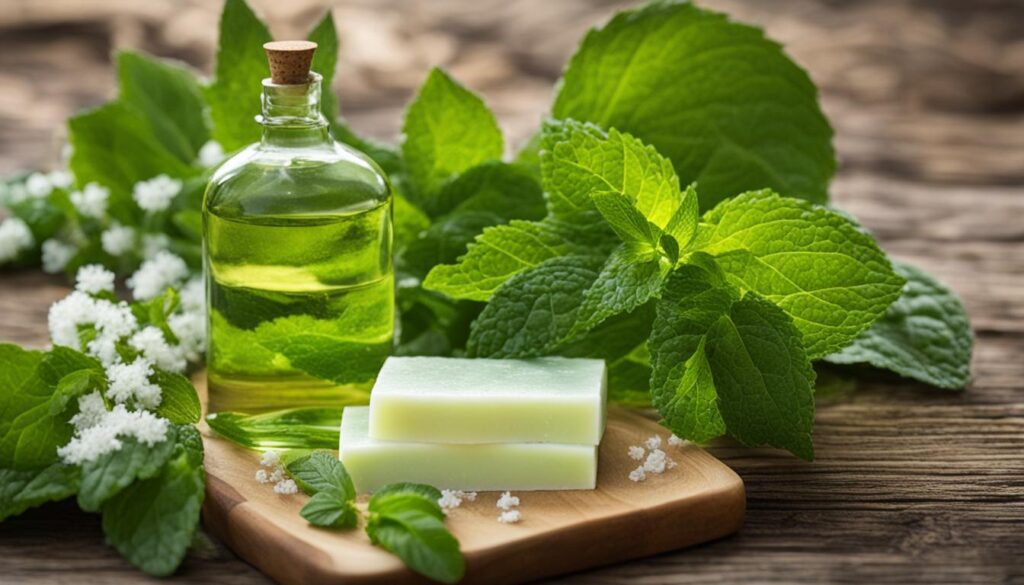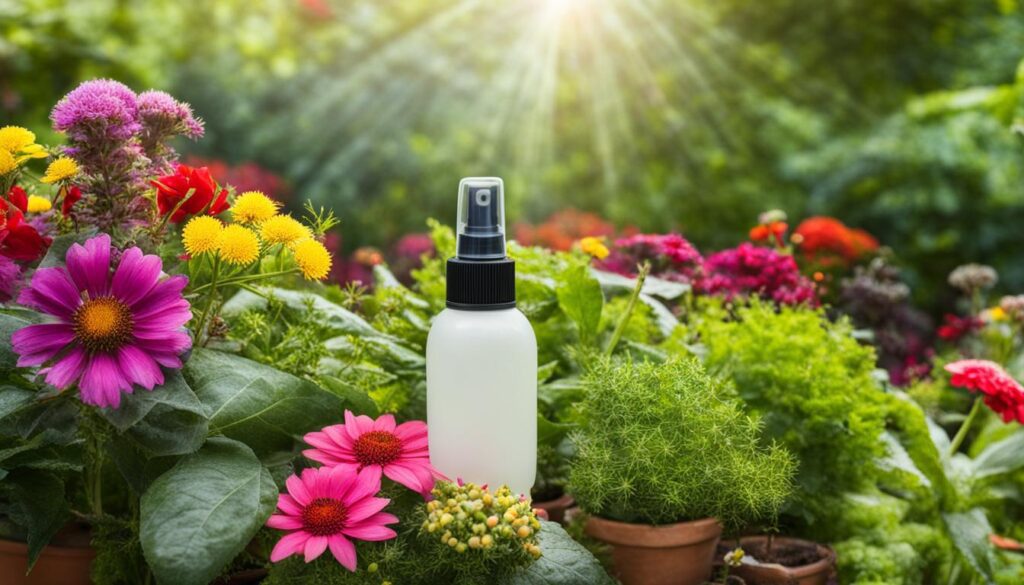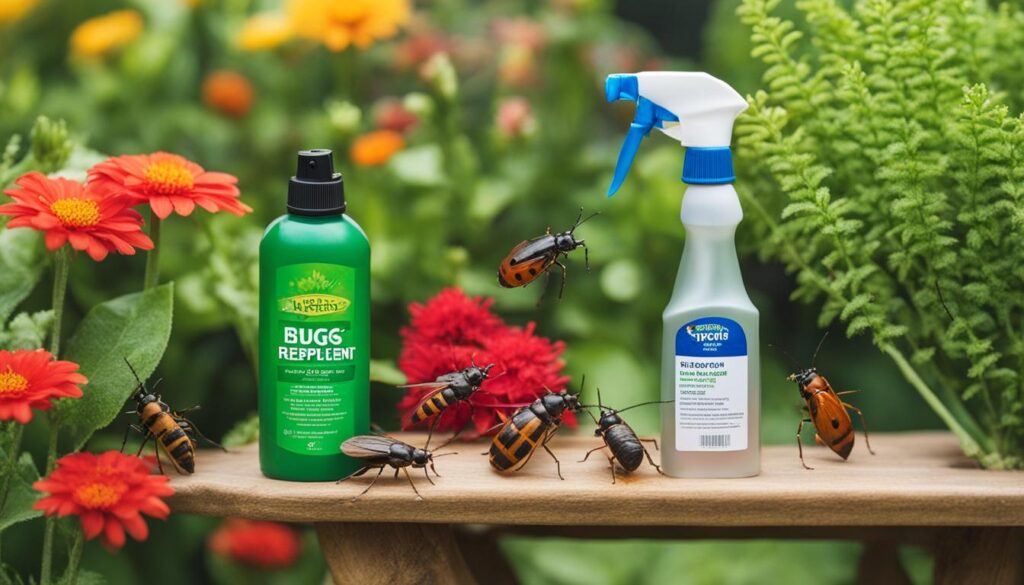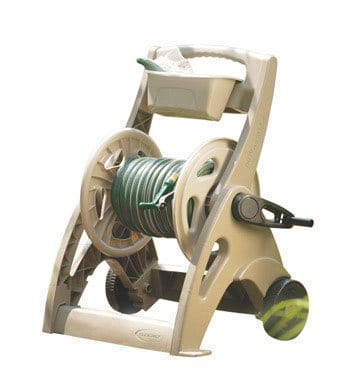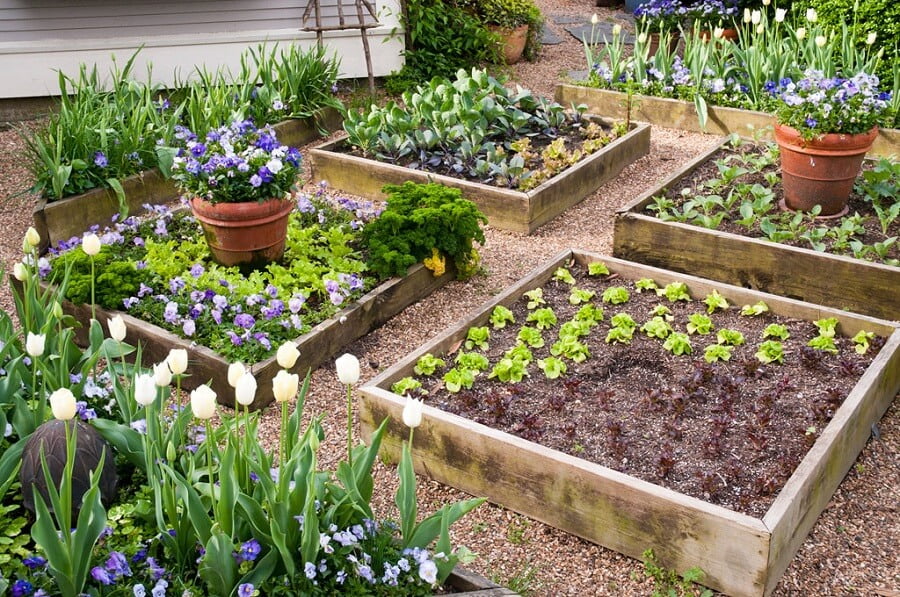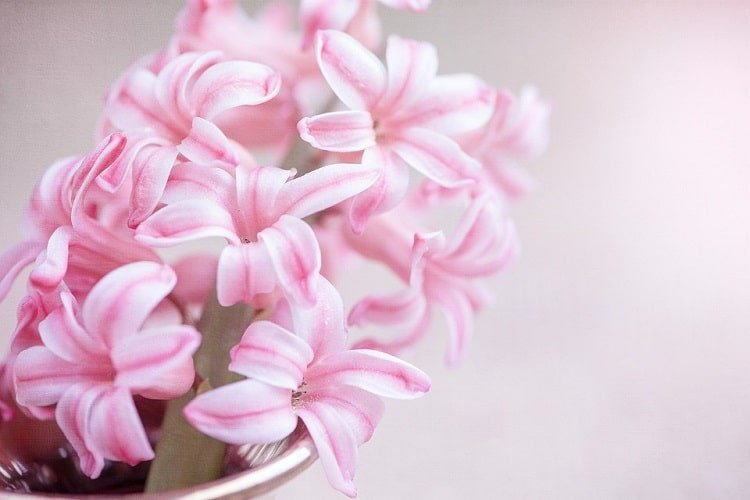Plant friendly bug sprays are a great way to keep pests at bay in your garden without harming your plants or the environment. Commercial insecticides often contain toxic chemicals that go against the principles of a sustainable garden. Homemade insect sprays provide a quick and effective solution, using ingredients commonly found in your pantry. These sprays can help ward off bugs while maintaining a healthy ecosystem in your garden. Additionally, incorporating companion plants and promoting plant diversity can further reduce the need for bug sprays.
Key Takeaways:
- Plant friendly bug sprays are a safe and effective alternative to commercial insecticides.
- Homemade insect sprays can be made using common pantry ingredients.
- Incorporating companion plants and promoting plant diversity can help reduce the need for bug sprays.
- Homemade insecticidal soap and neem oil bug spray are effective options for pest control.
- Vinegar can be used as a versatile bug repellent in your garden.
Homemade Insecticidal Soap: A Natural Solution for Aphids and Other Pests
When it comes to keeping pests at bay in your garden, homemade insecticidal soap is a go-to option for many gardeners. Not only is it effective against a range of pests like aphids, lacebugs, and thrips, but it is also gentle on your plants and the environment. By using simple ingredients that you already have in your pantry, you can create a powerful bug spray that won’t harm your plants or leave behind toxic residue.
To make your own insecticidal soap, all you need is vegetable oil and dishwashing soap or pure Castile liquid soap. Mix together one cup of vegetable oil with one tablespoon of dishwashing soap or pure Castile liquid soap. Dilute one teaspoon of the mixture with two cups of warm water in a spray bottle. Shake well before use and apply directly to the affected plants.
It is important to do a patch test before applying the spray to your entire garden. Spray a small area of your plants and observe for any adverse effects. If there are no negative reactions, you can proceed to spray the rest of your garden. Remember to reapply the soap spray after rainfall or heavy watering to ensure continued effectiveness.
Benefits of Homemade Insecticidal Soap:
- Plant-friendly: Homemade insecticidal soap is safe to use on a wide variety of plants, including vegetables, fruits, herbs, and ornamentals.
- Effective against pests: It can control aphids, lacebugs, leafhoppers, mealybugs, and thrips, among other common garden pests.
- Environmentally friendly: Unlike chemical insecticides, homemade insecticidal soap does not harm beneficial insects or contaminate soil and water sources.
With homemade insecticidal soap, you can effectively control pests in your garden while maintaining a healthy and sustainable environment for your plants and ecosystem.
Neem Oil Bug Spray: Organic Protection for a Variety of Pests
When it comes to organic insecticides, neem oil is a tried and true solution for gardeners. Derived from the seeds of the neem tree, this natural bug spray has been used for centuries in India to combat a wide range of pests. One of the key benefits of neem oil is its effectiveness against various pests at different stages of their life cycle, making it a versatile organic insecticide.
Neem oil is particularly effective against mites, whiteflies, aphids, thrips, and mealybugs. It works by disrupting the insects’ hormonal system, inhibiting their feeding and reproduction. To make neem oil bug spray, simply mix one to two tablespoons of pure, cold-pressed neem oil with a gallon of water. Adding a teaspoon of dish soap can help the oil adhere to the plants. This organic insecticide is safe for beneficial insects, birds, and pets as it gets absorbed into the plant’s tissue rather than sitting on the surface.
Using neem oil bug spray is not only effective but also environmentally friendly. By opting for an organic insecticide like neem oil, you avoid the use of harmful chemicals that can harm the ecosystem. Neem oil is a sustainable and plant-friendly alternative that allows you to protect your garden without compromising the health of your plants or the environment.
When using neem oil bug spray, it’s important to follow the instructions and apply it properly. Be sure to cover both sides of the leaves and spray in the morning or evening when the temperature is cooler. Test the spray on a small area of your plants before applying it to the entire garden to ensure your plants tolerate it well. By incorporating neem oil bug spray into your pest control routine, you can effectively manage a variety of garden pests while keeping your garden healthy and thriving.
Vinegar Spray: A Versatile Bug Repellent for Your Garden
When it comes to natural insect repellents, vinegar is a versatile and effective solution for your garden. With its strong odor and acidic properties, vinegar can deter a wide range of garden pests, making it an excellent choice for garden pest control.
To create a vinegar bug spray, simply mix one cup of white vinegar with three cups of water in a spray bottle. Adding half a teaspoon of dishwashing soap can help the solution adhere to the plants and increase its effectiveness. Shake the mixture well and apply it to the affected areas in your garden.
“Vinegar is an organic and cost-effective solution to repel common pests like aphids, whiteflies, and other garden bugs,” says gardening expert Jane Smith.
“The acetic acid in vinegar acts as a natural pesticide, disrupting the pests’ pheromone trails and deterring them from your plants.”
If you find the smell of vinegar to be too strong, you can add essential oils or citrus peels to the mixture to help temper the odor. This way, you can enjoy the benefits of vinegar as a natural insect repellent without being overwhelmed by the scent.
Benefits of Using Vinegar as a Bug Spray:
- Effective against aphids, whiteflies, and other garden bugs
- Organic and eco-friendly alternative to chemical pesticides
- Cost-effective solution for garden pest control
- Safe for plants, beneficial insects, and pets
By incorporating vinegar spray into your garden pest control routine, you can keep your plants protected from pests while maintaining a natural and healthy environment. Remember to always test the spray on a small area of your plants before applying it to the entire garden. With vinegar as your natural insect repellent, you can enjoy a thriving and pest-free garden.
Conclusion
Plant-friendly bug sprays provide a natural and effective solution for maintaining a healthy garden ecosystem and protecting your plants from pests. By using homemade sprays like insecticidal soap, neem oil, and vinegar, you can address pest problems without harming your plants or the environment.
Integrating these plant-friendly bug sprays into your pest control strategy, along with companion planting and promoting plant diversity, can help you achieve long-term garden health. These methods work together to create a balanced and thriving environment for your plants.
Remember to always test any bug spray on a small area of your plants before applying it to the entire garden. Following the recommended instructions for safe application is crucial to ensure effectiveness and protect both your plants and the ecosystem.
With the right bug sprays and gardening practices, you can enjoy a pest-free garden while promoting sustainability and preserving the health of your plants and the environment.
-Is All Natural Bug Spray Effective for Protecting Plants in the Garden?
Yes, all natural bug spray can be effective for protecting plants in the garden. Many essential oils like citronella, peppermint, and neem are known to repel bugs and are commonly used in all natural bug sprays. These natural ingredients can help to keep pests at bay without harmful chemicals.
FAQ
What are plant-friendly bug sprays?
Plant-friendly bug sprays are insecticides that effectively address pest problems in your garden without harming your plants or the environment.
Why should I use homemade bug sprays?
Homemade bug sprays provide a natural and sustainable solution to pest control, using ingredients commonly found in your pantry.
How do I make insecticidal soap?
To make insecticidal soap, mix one cup of vegetable oil with one tablespoon of dishwashing soap or pure Castile liquid soap. Dilute one teaspoon of the mixture with two cups of warm water in a spray bottle.
Can neem oil be used as a bug spray?
Yes, neem oil is an organic insecticide that is effective against various pests. Mix one to two tablespoons of pure, cold-pressed neem oil with a gallon of water to make a neem oil bug spray.
How can vinegar repel garden pests?
Vinegar, when mixed with water and dishwashing soap, can repel pests such as aphids and whiteflies. It can also help deter ants and other scent-driven pests.
Are homemade bug sprays safe for beneficial insects?
Yes, homemade bug sprays like insecticidal soap and neem oil are safe for beneficial insects, birds, and pets, as they get absorbed into the plant’s tissue rather than sitting on the surface.
How can I maintain a healthy garden ecosystem?
Incorporating plant diversity, companion planting, and using plant-friendly bug sprays can help maintain a healthy garden ecosystem and reduce the need for chemical insecticides.





